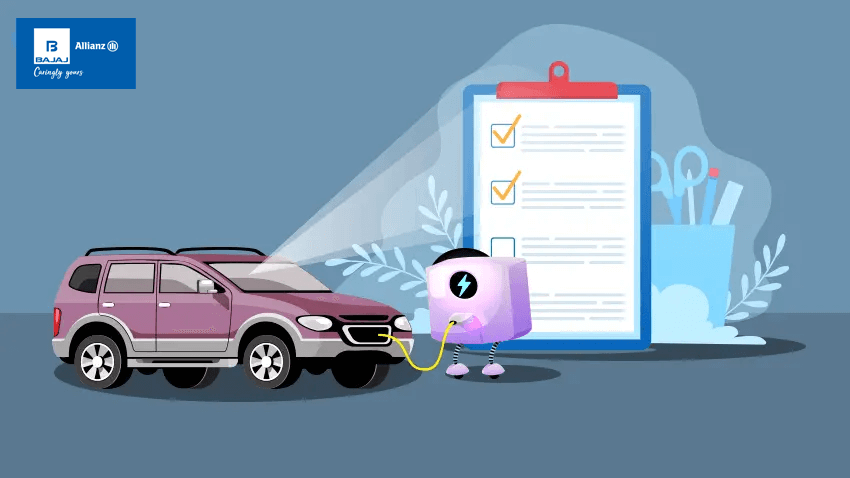If you are looking to buy a new car or bike, it is possible that you are thinking about buying an electric vehicle. You may be looking at the options available, what they have to offer, and which is the best one for you. Or you have already purchased a new electric car or bike, taken care of the electric vehicle insurance, and started to ply it on the road.
Once you decide to switch to an electric vehicle, or once you make it happen, there are a few considerations you need to keep in mind. Firstly, you need to ensure all the documents are in place. This includes the registration certificate of your vehicle, your driver’s licence, as well as your electric vehicle insurance. Once you do so, you also must think about the maintenance of your electric vehicle, be it a car, a scooter, or a commercial vehicle.
Furthermore, you must ensure you are completely equipped with all the information regarding the charging of your vehicle. EVs need to be charged, unlike fuel-based vehicles. So, whether you are using your electric bike for your daily commute or using your electric car to take a road trip, you need to know everything there is to know about charging your vehicle, including details of charging stations across the country.
Charging an EV
There is a greater market for electric vehicles today than there was a few years ago. For example, now there are electric vehicle insurance policies available for you to be able to insure your EV. As a result, there is also more infrastructure geared towards catering to new EV owners and their needs. This includes a growing number of charging stations for such cars and bikes across the country, but especially in cities. Even if there is no such infrastructure in your immediate vicinity, you can choose to charge your EV at home.
To be able to do so, you will need to connect your vehicle to a standard EV plug. This option is not available with Tesla cars. Moreover, it may not be possible to charge at such a setting if you are travelling with your EV. Thus, it is best to make note of all the charging stations available within a few kilometres radius of where you may be travelling.
Types of Charging
As an EV owner, you need to get acquainted with the different types of charging. Here are the different types of charging you should know about.
If your car requires a standard 120v grounded outlet, it possibly has a level 1 charging. The cables are standard across most electric cars now. They usually offer a mileage of about 65 km/hour for an 8-hour charge. This can be suitable for battery EVs that do not see frequent usage.
A 240-v circuit is required for a level 2 charging cable. In this case, an 8-hour charging session may end up providing a mileage of 290 km/h. These sorts of charging outlets are usually seen at public charging stations.
As the name suggests, this sort of charging offers the quickest sort of charging experience. In less than an hour of charge, it may offer a mileage of about 80 km/h to 145 km/h. This will depend on the type of car you own as well as the charging unit’s power output. This is found to be most suitable for vehicles frequent in use.
Cost of EV Charging
One of the motivations for people to buy is the rising cost of fuel, such as petrol and diesel, as opposed to the possibly lower costs of charging your EV. But is charging your electric vehicle really more affordable as compared to refuelling your car or bike?
As we have seen, there are two ways to charge your electric car or bike. You can either do it at a charging station or home. Charging your vehicle, depending on the type of charging required, can take anywhere between an hour to 7-8 hours. Lesser time is taken with fast charging equipment, given your vehicle is compatible with it.
Thus, the cost of charging your vehicle at home will be determined by the cost of electricity in your area. You can check for that and figure out how much charging time does your EV require. Charging stations may cost lesser. However, this depends on your region as well.
Caring for Your EV
Electric vehicles may no longer be limited to being owned as private vehicles. You could also use them as commercial vehicles. When you do so, ensure you have covered it with
electric commercial vehicle insurance.
The same is true for electric cars. Besides ensuring you are charging them correctly, you also need to ensure they are covered with electric car insurance. Having
electric car insurance can help you against having to pay out of pocket for any expenses that may arise when the car meets an accident.
Similarly, also ensure your two-wheeler is covered with
electric bike insurance. When using a two-wheeler within the country, it is necessary to cover it with at least a third-party liability coverage. Thus, it is important to buy at least a third-party liability electric bike insurance.
Insurance is the subject matter of solicitation. For more details on benefits, exclusions, limitations, terms, and conditions, please read the sales brochure/policy wording carefully before concluding a sale.
 Service Chat:
Service Chat: 

